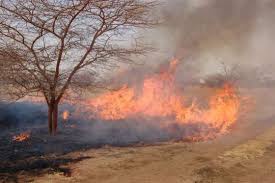Copyright ghanamma

Around 11 PM on Wednesday night, I locked myself in the staff common room, engrossed in the memoir of Kuan Yiu, trying to understand Singapore’s development path. I was struck by the fact that Singapore, a small island, is roughly the same age as Ghana, having gained independence around the same time. This was news to me, and I was so captivated by the book that I lost track of time. As I reflected on the contrast between Singapore’s limited resources and Ghana’s abundance, I was jolted by a strange sound: “parepareparepare…” I paid attention to it, and the rhythmic beat continued, prompting me to alert a colleague, a teacher known for watching TV in the staffroom at night. We stepped out to investigate and were met with a shocking sight: flames engulfing the campus. The once-lubricant grass, now dry and brown, was ablaze, spreading rapidly. We stood frozen, watching as the fire ravaged the land with incredible speed. Despite our efforts to locate the source, we couldn’t identify it. We suspected, however, that some cowboys who had been hunting rats on campus might have been responsible. Bush burning is an all-too-familiar occurrence in the Upper West Region, a problem as old as time. Every year, hundreds of acres of farmland are destroyed, leaving farmers ruined and impoverished. Even when farmers take precautions, constructing fire belts around their farms, the fire can still spread, destroying everything in its path. It’s heartbreaking to think that someone’s thoughtless actions can destroy a farmer’s life’s work. The reasons behind these acts are often ridiculous, rooted in ignorance and a lack of education. We must work together to address this issue, through education, sensitization, and law enforcement. Chiefs, local assemblies, the Fire Service, NADMO, and farmers must collaborate to prevent these destructive acts. Almost every year, hundreds of acres of farms are destroyed by bush burning, leaving farmers frustrated and impoverished. The fire’s wild nature often finds its way into farms, destroying unharvested produce. Imagine losing your life’s investment due to someone’s reckless actions! The reasons for burning the bush are often ridiculous, driven by ignorance and a lack of education. We must confront this issue through collaboration, education, and law enforcement. Chiefs, local assemblies, the Fire Service, NADMO, and farmers must work together to prevent these destructive acts. Currently, many farmers are still harvesting, and any fire incident can destroy their farms, leading to food insecurity.



